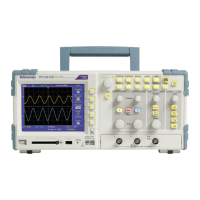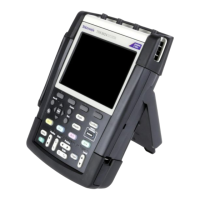Reference
Trigger settin
gs
Single Seq acquisition mode
Recall a setup
XY Display format
Persistence
The Autorange function is usually more useful than Autoset in the following
situations:
Analyzing a dynamically changing signal
Quickly comparing a sequence of several signals without adjusting the
oscilloscope. This is very useful if you need to use two probes at the same
time, or if you need to use a probe in one hand and are holding something
else in the other.
Controlling which settings the oscilloscope automatically adjusts
If your signals vary in frequency, but have similar amplitudes, you can use
Horizontal Only autoranging. The oscilloscope will adjust the horizontal settings,
but leave the vertical settings unchanged. This way, you can visually estimate
the amplitude of the signal without worrying about the vertical scale changing.
Vertical Only autoranging works similarly, adjusting vertical pa
rameters and
leaving the horizontal settings unchanged.
Autoset
When you push the AutoSet button, the oscilloscope
identifies the type of
waveform and adjusts controls to produce a usable display of the input signal.
Function Setting
Acquire mode
Adjusted to Sample or Peak Detect
Cursors Off
Display format Set to YT
Display type
Set to Dots for a video signal, set to Vectors for an FFT
spectrum; otherwise, unchanged
Horizontal position Adjusted
Horizontal Scale
Adjusted
Trigger coupling
Adjusted to DC, Noise Reject, or HF Reject
Trigger holdoff
Minimum
Trigger level
Set to 50%
Trigger mode Auto
Trigger source
Adjusted; refer to the information after this table; cannot
use Autoset on the EX T TRIG signal
TPS2000B Series Digital Oscilloscope User Manual 97

